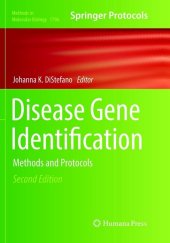 Neuerscheinungen 2019Stand: 2020-02-01 |
Schnellsuche
ISBN/Stichwort/Autor
|
Herderstraße 10
10625 Berlin
Tel.: 030 315 714 16
Fax 030 315 714 14
info@buchspektrum.de |

Johanna K. DiStefano
Disease Gene Identification
Methods and Protocols
Herausgegeben von DiStefano, Johanna K.
2. Aufl. 2019. x, 400 S. 13 SW-Abb., 50 Farbabb. 254 mm
Verlag/Jahr: SPRINGER, BERLIN; SPRINGER NEW YORK; HUMANA PRESS 2019
ISBN: 1-493-98496-9 (1493984969)
Neue ISBN: 978-1-493-98496-1 (9781493984961)
Preis und Lieferzeit: Bitte klicken
This volume presents detailed laboratory procedures in an easy to follow format that can be carried out with success by investigators lacking previous exposure to a specific research method. Chapter guide readers through the application of molecular approaches to disease gene identification and overviews, and case studies are also presented. Written in the highly successful Methods in Molecular Biology series format, chapters include introductions to their respective topics, lists of the necessary materials and reagents, step-by-step, readily reproducible laboratory protocols, and tips on troubleshooting and avoiding known pitfalls.
Authoritative and practical, Disease Gene Identification: Methods and Protocols, Second Edition aims to help with the identification and characterization of many more disease-related genes and provide novel, and effective strategies for disease treatment and prevention.
Part I: Introduction
1. Identification of Disease Susceptibility Alleles in the Next Generation Sequencing Era
Johanna K. DiStefano and Christopher B. Kingsley
2. Induced Pluripotent Stem Cells in Disease Modeling and Gene Identification
Satish Kumar, John Blangero, and Joanne E. Curran
3. Development of Targeted Therapies Based on Gene Modification
Taylor Benson, Fatjon Leti, and Johanna K. DiStefano
4. What can we Learn about Human Disease from the Nematode C. elegans?
Javier Apfeld and Scott AlperstParagr
5. Microbiome Sequencing Methods for Studying Human Diseases
Rebecca M. Davidson and L. Elaine Epperson
6. The Emerging Role of Long Noncoding RNAs in Human Disease
Johanna K. DiStefano
Part II: Methods for Gene Identification
7. Identification of Disease-related Genes using a Genome-wide Association Study Approach
Tobias Wohland and Dorit Schleinitz
8. Whole Genome Library Construction for Next Generation Sequencing
Jonathan
J. Keats, Lori Cuyugan, Jonathan Adkins, and Winnie S. Liang
9. Whole Exome Library Construction for Next Generation Sequencing
Winnie S. Liang, Kristi Stephenson, Jonathan Adkins, Austin Christofferson, Adrienne Helland, Lori Cuyugan, and Jonathan J. Keats
10. Optimized Methodology for the Generation of RNA-sequencing Libraries from Low-input Starting Material: Enabling Analysis of Specialized Cell Types and Clinical Samples
Brian O´Connor and Kendra Walton
11. Using C1 to Generate
Single-cell Full-length cDNA Libraries for mRNA Sequencing
Robert Durruthy-Durruthy and Manisha Ray
12. MiSeq: A Next Generation Sequencing Platform for Genomic Analysis
Rupesh Kanchi Ravi, Kendra Walton, and M
ahdieh Khosroheidari
13 Methods for CpG Methylation Array Profiling via Bisulfite Conversion
MsoListParagraphCxSpLast" style="margin-left: 0.0in;"Fatjon Leti, Lorida Llaci, Ivana Malenica, and Johanna K. DiStefano
Part III: Functional Characterization of Susceptibility Alleles and Loci
14. miRNA Quantification Me
thod using Quantitative Polymerase Chain Reaction in Conjunction with the Cq Methodspan
Fatjon Leti and Johanna K. DiStefanoserif in-left: 0.0in;"Gene Editing of Primary Human Airway Epithelial Cells
Jamie L. Everman, Cydney Rios, and Max A. Seibold
16. RNA Interference to Knockdown Gene Expression
Haiyong Han
17. Using Luciferase Reporter Assays to Identify Functional Variants at Disease-associated Loci
Anup K. Nair and Leslie J. Baier
PART IV: Identification of Disease Genes
18. Physiologic Interpretation of GWAS Signals for type 2 Diabetes
Richard M. Watanabe
19. Identification of Genes for Hereditary Hemochromatosis
Glenn S. Gerhard, Barbara V. Paynton, and Johanna K. DiStefano
20. Identification of Driver Mutations in Rare Cancers: The Role of SMARCA4 in Small Cell Carcinoma of the Ovary, Hypercalcemic Type (SCCOHT)
Jessica D. Lang and William P.D. Hendricksan
21. The Rise and Fall and Rise of Linkage Analysis as a Technique for Finding and Characterizing Inherited Influences on Disease Expression
Ettie M. Lipner and David A. Greenberg


